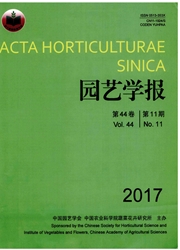

 中文摘要:
中文摘要:
以10个不同基因型黄瓜为试材进行游离小孢子培养,通过对成胚条件的系统研究,从‘7447’和‘Poinsett97’中获得了子叶形胚和再生植株。研究结果表明:基因型和小孢子发育时期是限制黄瓜游离小孢子成胚的关键因子。不同品种间胚状体产量差异显著,每皿产胚1.5~33.4个。单核靠边期是进行黄瓜游离小孢子培养的最佳时期。低温预处理有利于胚状体的诱导,4℃预处理2~4d为宜,以处理2d的胚状体产量最高。外源激素在诱导胚状体时并非必需,但低浓度外源激素(0.5mg.L^-1 2,4-D、0.2mg.L^-1 6-BA)能促进小孢子成胚。NLN和B5两种基础培养基在诱导胚状体上无显著差异。子叶形胚易分化成苗,而其它类型的胚状体未能获得再生植株。
 英文摘要:
英文摘要:
Isolated microspore culture in cucumber was studied by using 10 different varieties of cucumber. Cotyledonary embryoids and plantlets were obtained from ' 7447' and ' Poinsett97' genotypes for the first time. The results showed that genotype and the developmental stage of mierospore were the key factors in embryoid induction. The embryoid yield was different significantly among different genotypes. Embryoid yield per culture dish varied from 1.5 - 33.4. The late-uninueleate stage of mierospore was found optimum for isolated mierospore culture in cucumber. Cold-pretreatment (4℃ ) for 2 -4 days also promoted embryoid induction, while the highest embryoid yield was obtained form mierospore pre-treated at 4 ℃ for 2 days. The results also indicated that low concentration of exogenous hormones (0. 5 mg· L^-1 2, 4-D and 0. 2 mg· L^-1 6-BA) were conductive to embryogenesis, whereas NLN and B5 medium had no significant difference on embryoid induction. The regenerated plantlets were obtained only from cotyledonary embryoids and no plantlet was produced from the embryoids at other developmental stages.
 同期刊论文项目
同期刊论文项目
 同项目期刊论文
同项目期刊论文
 Inheritance of aspartate aminotransferase (AAT) in Cucumis species as revealed by interspecific hybr
Inheritance of aspartate aminotransferase (AAT) in Cucumis species as revealed by interspecific hybr Cytological diploidization and rapid genome changes of the newly synthesized allotetraploids Cucumis
Cytological diploidization and rapid genome changes of the newly synthesized allotetraploids Cucumis Resistance to gummy stem blight in melon (Cucumis melo L.) germplasm and inheritance of resistance f
Resistance to gummy stem blight in melon (Cucumis melo L.) germplasm and inheritance of resistance f Ty1-copia retrotransposon-based SSAP marker development and its potential in the genetic study of cu
Ty1-copia retrotransposon-based SSAP marker development and its potential in the genetic study of cu Occurrence and distribution of Cucumber mosaic virus infecting Danshen (Salvia miltiorrhiza) in Chin
Occurrence and distribution of Cucumber mosaic virus infecting Danshen (Salvia miltiorrhiza) in Chin Selection of appropriate reference genes for gene expression studies by quantitative real-time PCR i
Selection of appropriate reference genes for gene expression studies by quantitative real-time PCR i Expression and sequence variation of the cucumber Por gene in the synthesized allotetraploid Cucumis
Expression and sequence variation of the cucumber Por gene in the synthesized allotetraploid Cucumis Rapid Amplification of Flanking Sequences of a Known DNA Region by Partial Restriction Digestion and
Rapid Amplification of Flanking Sequences of a Known DNA Region by Partial Restriction Digestion and Efficient embryo induction in cucumber ovary culture and homozygous identification of the regenetant
Efficient embryo induction in cucumber ovary culture and homozygous identification of the regenetant 期刊信息
期刊信息
